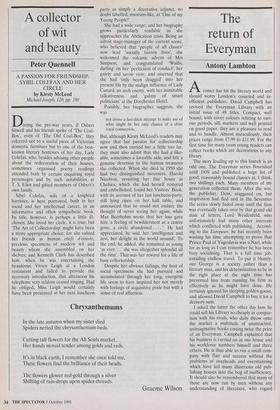A collector of wit and beauty
Peter Quennell
A PASSION FOR FRIENDSHIP: SYBIL COLEFAX AND HER CIRCLE by Kirsty McLeod Michael Joseph, £20, pp. 180 During the pre-war years, if Osbert Sitwell and his friends spoke of 'The Coal- Box', even of 'The Old Coal-Box', they referred not to a useful piece of Victorian domestic furniture but to one of the best- known literary hostesses of her day, Lady Colefax, who, besides advising other people about the redecoration of their houses, sometimes organised poetry readings attended both by certain enquiring royal personages and by such notabilities as T. S. Eliot and gifted members of Osbert's own family.
Sibyl Colefax, wife of a knighted barrister, is here portrayed, both in her social and her intellectual career, in an informative and often sympathetic book. Its title, however, is perhaps a little ill- chosen. She loved her circle, it is true; but 'The Art of Collectorship' might have been a more appropriate choice; for she valued her friends as human chefs d'oeuvre, precious specimens of modern wit and beauty whom she assembled on her shelves; and, Kenneth Clark has described how, when he was entertaining the beauteous Vivien Leigh at a London restaurant and failed to provide the necessary introduction, that afternoon his telephone very seldom ceased ringing. Had he obliged, Miss Leigh would certainly have been presented at her next luncheon
party as simply a decorative adjunct, no doubt labelled, museum-like, as 'One of my Young People!'
She had a wide range; and her biography grows particularly readable as she approaches the Abdication crisis. Being an adroit stage-manager of the current scene, who believed that 'people of all classes' now lead 'socially barren lives', she welcomed the volcanic advent of Mrs Simpson, and congratulated 'Wallis, darling' on her 'perfection of conduct', her gaiety and savoir vivre, and asserted that she had 'only been dragged' into her present life by the malign influence of Lady Cunard, an arch enemy, with her inimitable talkativeness and 'galaxy of smart politicians' at the Dorchester Hotel.
Possibly, her biographer suggests, she was
not above a last-ditch attempt to make use of what might be her only chance of a close royal connection.
But, although Kirsty McLeod's readers may agree that her passion for collectorship now and then carried her a little too far, they must also admit that she had a like- able, sometimes a loveable side, and felt a genuine devotion to the human treasures she collected. When she died in 1950 she had two distinguished mourners. Harold Nicolson, revisiting her fine house in Chelsea, which she had herself restored and embellished, found her Visitors' Book, with its account of her last luncheon-party, still lying open on her hall table, and announced that he could not endure the thought of never seeing her again; while Max Beerbohm wrote that her loss gave him 'a feeling of bewilderment at a centre gone, a circle abandoned ... . ' He had appreciated, he said, her 'intelligence and zest, her delight in the world around'. To the end, he added, she remained as young 'as ever... she was altogether splendid all the time'. That was her reward for a life of busy collectorship.
Despite her obvious failings, the host of social specimens she had pursued and accumulated through her long, energetic life seem to have inspired her not merely with feelings of acquisitive pride but with a sense of real affection.


















































 Previous page
Previous page